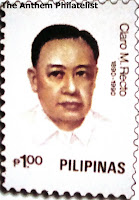Claro M. Recto on Stamps

Claro Mayo Recto, Jr. (February 8, 1890 – October 2, 1960), was a Filipino politician, jurist, poet and one of the foremost statesmen of his generation. He is remembered mainly for his nationalism, for "the impact of his patriotic convictions on modern political thought".
He was born in Tiáong, Tayabas (now known as Quezon province) of educated, upper middle-class parents, namely Claro Recto [Sr.] of Rosario, Batangas, and Micaela Mayo of Lipa, Batangas. He studied Latin at the Instituto de Rizal in Lipa, Batangas from 1900 to 1901. Further schooling was at the Colegio del Sagrado Corazón of Don Sebastián Virrey. He moved to Manila to study at the Ateneo de Manila where he consistently obtained outstanding scholastic grades, graduating with a Bachelor of Arts degree maxima cum laude. He received a Masters of Laws degree from the University of Santo Tomás.
Claro M. Recto, Jr. is considered the "finest mind of his generation". Through his speeches and writings, he was able to mold the mind of his Filipino contemporaries and succeeding generations, a skill "only excelled by Rizal's".
He left a mark on the patriotic climate of his time and a lasting legacy to those who succeeded him. Such icons of nationalism as Lorenzo Tanada, José Diokno, Renato Constantino, Jovito Salonga, refer to him as a mentor and forerunner.
Teodoro M. Locsín of the Philippines Free Press, defines Recto's genius, thus:
"Recto is not a good speaker, no. He will arouse no mob. But heaven help the one whose pretensions he chooses to demolish. His sentences march like ordered battalions against the inmost citadel of the man's arguments, and reduce them to rubble; meanwhile his reservations stand like armed sentries against the most silent approach and every attempt at encirclement by the adversary. The reduction to absurdity of Nacionalista senator Zulueta's conception of sound foreign policy was a shattering experience, the skill that goes into the cutting of a diamond went into the work of demolition. There was no slip of the hand, no flaw in the tool. All was delicately, perfectly done... Recto cannot defend the indefensible, but what can be defended, he will see to it that it will not be taken."
Date of Issue: June 1, 1990






